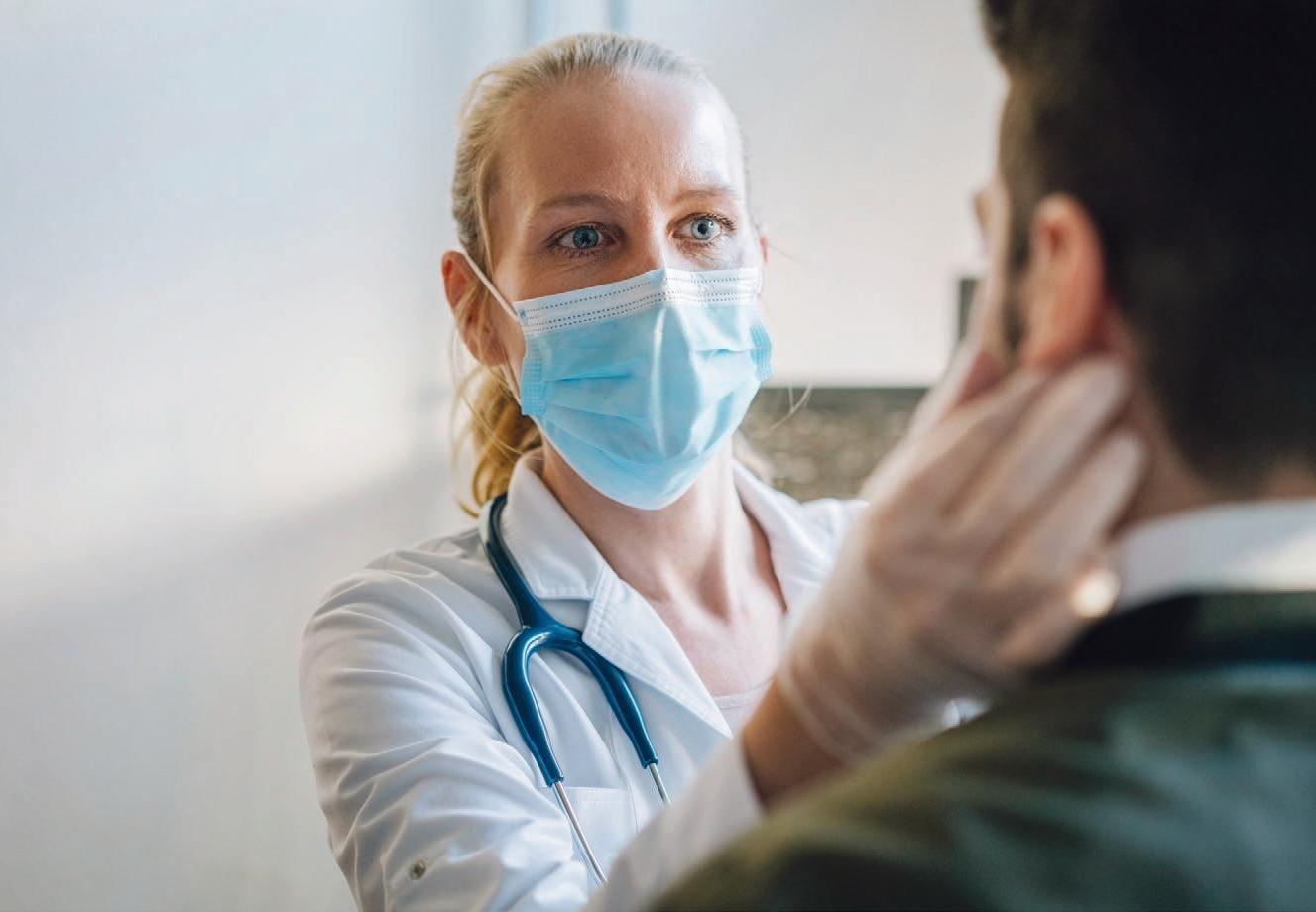
5 minute read
Breast Cancer Screenings Help Save Lives
Barbara Fregia, breast cancer patient
BREAST CANCER SCREENING RECOMMENDATIONS
Some overall recommendations about breast cancer screening include:
Use breast self-exams to become familiar
with your breasts. Women should become familiar with their breasts to identify changes by checking their breasts during a breast self-exam.
If there is a change, lumps or other unusual signs in your breasts, talk to your doctor right away.
Have an annual mammogram once you turn 40 if your risk of breast cancer is average.
Houston Methodist follows the American
College of Radiology's recommendations that all women should get an annual mammogram starting at age 40.
Consider scheduling an annual
mammogram earlier than age 40 if you have a higher risk of developing breast cancer due to family history or other factors. In addition, your doctor may also recommend a MRI screening in combination with a mammogram to create a more detailed image of the breast.
Dr. Esther Dubrovsky
Dr. Ana Benveniste W hile you may know about the importance of regular breast cancer screenings, do you actually take the time to have a yearly mammogram?
If it’s been a while since your last exam, then consider Barbara Fregia’s experience with breast cancer. She credits her passionate commitment to yearly mammography with helping her reach survivor status after she was treated for breast cancer in 2019 at the Houston Methodist Cancer Center at Baytown.
A STARTLING DISCOVERY Fregia, a 62-year-old Dayton resident, was diagnosed with stage 1 breast cancer in January 2019 despite not having a family history of the disease. “Since I didn’t have a family history of cancer, I never thought it could happen to me,” Fregia said.
“Exams, such as mammograms, are able to find cancer when it’s very small and often before symptoms are present,” said Dr. Esther Dubrovsky, breast surgeon with Houston Methodist Baytown Hospital and a member of Fregia’s treatment team.
SCREENINGS ARE KEY Recommendations on when women should begin screening mammograms and how often they should be done vary, so it’s important to check with your doctor. (See “Breast Cancer Screening Recommendations.”) “Talk with your doctor about your risk factors and personal preferences to decide on a screening schedule that is right for you, especially if you have a family history of breast cancer,” said Dr. Ana Benveniste, breast radiologist with Houston Methodist Baytown, and another member of Fregia’s team.
During the COVID-19 crisis, our imaging and radiology services are available. The safety of our patients and staff is our first priority, and we are taking every precaution to keep everyone safe. We are: Screening all patients when scheduling appointments and upon arrival.
Wearing masks and other personal protective equipment while providing care.
Implementing additional sanitation processes to disinfect all equipment and surfaces. Redesigning waiting rooms to ensure social distancing.

A TEAM APPROACH TO CARE After her diagnosis, Fregia’s treatment began with surgery, followed by chemotherapy and radiation treatments. In addition to Dubrovsky and Benveniste, other members of her treatment team included Dr. Cesar De Las Casas, medical oncologist-hematologist, and Dr. Mary Goswitz, radiation oncologist.
This team, together with the nursing staff, guided Fregia through the treatment regimen that concluded with her “ringing the bell” in November 2019 to signify the end of her chemo and radiation treatments.
“If you’re diagnosed with breast cancer, it’s so important to take care of yourself,” Fregia said. “Many women are so busy taking care of their families that they forget to take care of themselves.”
These days, Fregia does not hesitate to offer advice for women who aren’t as diligent in scheduling yearly mammograms, “Women shouldn’t wait to schedule their mammograms. They might not find the cancer in their self-exams, so there’s no telling how widespread it could be by the time it’s discovered.”
REDUCE YOUR RISK FOR BREAST CANCER
Even though each woman’s risk for breast cancer is different, some changes may help prevent cancer. Controlling weight, limiting alcohol and exercising regularly are the most common ways to help prevent cancer, but there are a few others to consider:
1Breastfeed. The longer mothers breastfeed, the greater the protection against breast cancer.
2Know the risks of hormone therapy. If you’re taking hormone therapy for menopausal symptoms, consult with your doctor about the risks and benefits, and ask about other options. Long-term hormone therapy may increase your risk for breast cancer.
3Avoid exposure to environmental pollution. Our environment exposes us to dangers like car exhaust and air pollution. Limiting your exposure may help protect against an increased risk of breast cancer.
Keep Healthy by Continuing Screenings A healthy lifestyle and regular breast cancer screenings are good ways to keep your health in check. Partner with your doctor to discuss your health history and stay on top of your recommended screenings.
Houston Methodist Breast Care Center at Baytown, located in Houston Methodist Baytown Hospital’s outpatient center, is a nationally accredited facility offering comprehensive imaging services, including all-digital mammography, 3D imaging, breast ultrasound and breast MRI. To schedule a mammogram, visit houstonmethodist.org/ imaging or call 346.292.PINK (7465).
Houston Methodist Baytown Hospital 4401 Garth Rd. Baytown, TX 77521-2122 houstonmethodist.org/baytown
If you prefer to not receive future communication from Houston Methodist, please email optout@houstonmethodist.org or call 713.790.3333.
IMAGES MAY BE FROM ©GETTY AND/OR ©HOUSTON METHODIST.
LEADING MEDICINE IN GREATER HOUSTON





KEEP YOU MOVING without joint pain
NON PROFIT US POSTAGE PAID TWIN CITIES MN PERMIT NO 31657

281.428.2273 HOUSTONMETHODIST.ORG/BAYTOWN
Live life without joint pain.



At Houston Methodist Orthopedics & Sports Medicine at Baytown, we know that joint pain affects every part of your life. With treatment plans customized for you, our specialists offer a full range of advanced nonsurgical and surgical techniques. Our expert joint care includes:
Innovative pain control methods
Physical therapy to improve mobility and range of motion
The latest technology, including minimally invasive surgical techniques that help reduce recovery time
During the COVID-19 crisis, Houston Methodist has implemented additional safety precautions to ensure that we provide safe and effective care to our patients.
69

45
610 8

Baytown
Schedule an appointment: houstonmethodist.org/jointpain 281.427.7400






